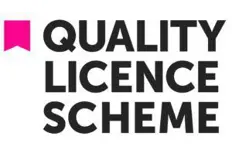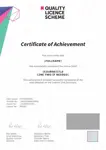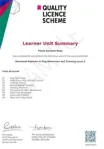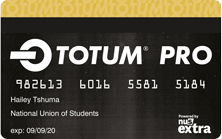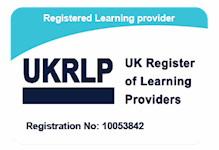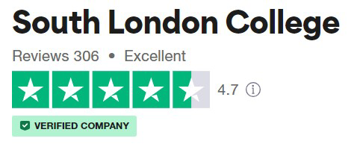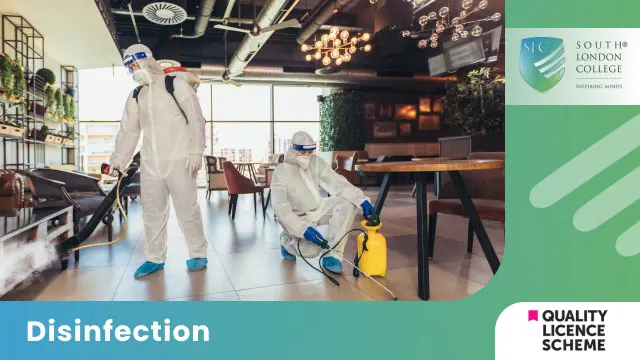
Disinfection Training Diploma
Level 3 Diploma | No Hidden Costs | Original QLS Endorsed Certificate Included
South London College
Summary
- Certificate of completion - Free
- Exam(s) / assessment(s) is included in price
- TOTUM card available but not included in price What's this?
Add to basket or enquire
Overview
Diploma in Disinfection Basics - Level 3
Disinfection is the process of clearing something to destroy or control bacteria and viruses from spreading. Disinfection is usually done by the use of chemicals and is an important concept that has to be followed by each and every single individual to lead a healthy and disease-free life. However, it is an even more important concept in industries such as healthcare, collection systems, water supply and public health industries to help professionals effectively carry about their day to day duties. Therefore, South London College has introduced this Diploma in Disinfection Basics at QLS Level 3 (USA Standards) to help the interested parties develop a basic knowledge on disinfection.
This basics course will discuss about the various waterborne pathogens to understand their harmful nature. You will get in terms with the basic disinfection rules that will help you get rid of bacteria and virus, after which the course will educate you on Halogen, Chlorine and alternative disinfectants. The Disinfection course will also guide you how to promote respiratory protection through proper disinfection. By the end of the Disinfection course, you will have a significant knowledge on the basics of disinfection to put them into use when required.
The Quality Licence Scheme, endorses high-quality, non-regulated provision and training programmes. This means that Imperial Learning Limited* has undergone an external quality check to ensure that the organisation and the courses it offers, meet defined quality criteria. The completion of the Disinfection course alone does not lead to a regulated qualification but may be used as evidence of knowledge and skills gained. The Learner Unit Summary may be used as evidence towards Recognition of Prior Learning if you wish to progress your studies in this subject. To this end the learning outcomes of the course have been benchmarked at Level 3 against level descriptors published by Quality Licence Scheme, to indicate the depth of study and level of demand/complexity involved in successful completion by the learner.
The Disinfection course itself has been designed by Imperial Learning Limited* to meet specific learners’ and/or employers’ requirements which cannot be satisfied through current qualifications.
Quality Licence Scheme endorsement involves robust and rigorous quality audits by external auditors to ensure quality is continually met. A review of courses is carried out as part of the endorsement process.
Please Note: The Disinfection Course is Based on USA Standards
Eligible for TOTUM card - TOTUM is the #1 student discount card and app giving you access to exclusive student deals on food and fashion, tech and travel and everything in between.
*Regulated qualification refers to those qualifications that are regulated by Ofqual / CCEA / Qualification Wales
Achievement
Course media
Description
What Will I Learn?
- Gain insight into the waterborne pathogens.
- Learn the disinfection rules.
- Understand Halogen and chlorine and their role in disinfection.
- Have a clear understanding of alternative disinfectants.
- Learn about respiratory protection and its importance in disinfecting.
COURSE CURRICULUM
★ MODULE 01 : Waterborne Pathogens
- Viral-Caused Diseases
- Protozoan Caused Diseases
- Bacteriological Monitoring Section
- of Samples per System Population
- Positive or Coliform Present Results
- Heterotrophic Plate Count (HPC)
- Total Coliforms
- Chlorine Key Words
- Related Acronyms
★ MODULE 02 : Disinfection
- Disinfection Introduction
★ MODULE 03 : Halogen Section
- pH Section
- Fluorine Section
- Bromine Section
- Iodine Section
- Astatine Section
★ MODULE 04 : Chlorine Section
- Chlorine Timeline
- Chlorine Introduction
- Chlorine Exposure Limits
- Chlorine’s Atomic Structure
- Chlorine Basics
- Chemistry of Chlorination
- Chlorinator Components
- Chlor-Alkali Membrane Process
- Chlorine’s Effectiveness
- Chlorine Gas Section
- DPD Method for Chlorine Residuals
- Amperometric Titration
- Sodium Hypochlorite Section
- Sodium Hypochlorite Solutions
- Exposure
- Disadvantages
- Shock Chlorination—Simple Well Maintenance
- Calcium Hypochlorite Section
- Dose Rate Math
- Potential Sequelae
- Chloramine Section
- Chlorine Production Section
- System Operations
- Salt Addition
- Sodium Hydroxide Dilution
- System Maintenance
- Chlorination Equipment Requirement Section
- Weigh Scales
- Chlorine Health Hazard Section
- Advanced Treatment
- Chlorine Storage
- Special Requirements
- Chlorine Dioxide Section
- Phosphine
- Disinfection Rule Review Question284
★ MODULE 05 : Alternative Disinfectants
- Photoelectric Cell
- Ultraviolet Radiation Advantages and Disadvantages
- Ozone Section
- Ozone Advantages
- Alternate Disinfectants Section Summary
★ MODULE 06 : Respiratory Protection Section
- The Importance of Correct Fit
- OSHA Regulation Overview
- Example of RP Employee Responsibilities
- Program Evaluation
- Recordkeeping
- Training Certificate Example
- Fit Testing Hands-on Respirator Training
- Identification of Filters & Cartridges
- RESPIRATORY PROTECTION PROGRAM CHECKLIST
- Respiratory Protection Schedule by Job and Working
- Medical Determination
- Related Gas and Vapor Contaminants
- Respirator Storage Section
- Personal Protective Equipment Example Section
- Selection Guidelines for Head Protection
★ MODULE 07 : Laboratory Analysis
- Method 1623: Cryptosporidium and Giardia in Water by Filtration IMS/FA
- Method 1604: Total Coliforms and Escherichia coliin Water by Membrane Filtration Using a Simultaneous Detection Technique (MI Medium)
- Method 1605: Aeromonas in Finished Water by Membrane Filtration using Ampicillin-Dextrin Agar with Vancomycin (ADA-V) Disclaimer
- Disinfection Supplement
- Common Water Treatment and Distribution Chemicals
- Glossary
- Waterborne Microorganisms and Bacteria Appendix
- Chlorine Charts
- Math Conversion Factor Section
Access Duration
The Disinfection course will be directly delivered to you, and you have 12 months access to the online learning platform from the date you joined the Disinfection course. The Disinfection course is self-paced and you can complete it in stages, revisiting the lectures at any time.
Method of Assessment
In order to complete the Diploma in Disinfection Basics - Level 3 successfully, all students are required to complete a series of assignments. The completed assignments must be submitted via the online portal. Your instructor will review and evaluate your work and provide your feedback based on how well you have completed your assignments.
Certification
At the end of the Disinfection course successful learners will receive a Certificate of Achievement from the Quality Licence Scheme and a Learner Unit Summary (which lists the components the learner has completed as part of the course).
Course Code: QLS-04877
Awarding Body (Accreditation)
The Quality Licence Scheme has long-established reputations for providing high quality vocational qualifications across a wide range of industries. The Quality Licence Scheme combines over 180 years of expertise combined with a responsive, flexible and innovative approach to the needs of our customers.
Renowned for excellent customer service, and quality standards, The Quality Licence Scheme also offer regulated qualifications for all ages and abilities post-14; all are developed with the support of relevant stakeholders to ensure that they meet the needs and standards of employers across the UK.
Who is this course for?
- Students
- Job seekers
- Collection System professionals
- Water Supply professionals
- Public Health professionals
- Medical professionals
Requirements
- Learners should be age 19 or over, and must have a basic understanding of Maths, English, and ICT.
- A recognised qualification at level 2 or above in any discipline.
Career path
- Doctors - £50,804 per annum
- Registered Nurse - £23,668 per annum
- Collection System Operator
- Public Health Inspector
- Water Supply Supervisor
Other jobs you can get
- Sterilisation Technician
- Water Resources Worker
Questions and answers
Currently there are no Q&As for this course. Be the first to ask a question.
Certificates
Certificate of completion
Digital certificate - Included
Reviews
Currently there are no reviews for this course. Be the first to leave a review.
Legal information
This course is advertised on reed.co.uk by the Course Provider, whose terms and conditions apply. Purchases are made directly from the Course Provider, and as such, content and materials are supplied by the Course Provider directly. Reed is acting as agent and not reseller in relation to this course. Reed's only responsibility is to facilitate your payment for the course. It is your responsibility to review and agree to the Course Provider's terms and conditions and satisfy yourself as to the suitability of the course you intend to purchase. Reed will not have any responsibility for the content of the course and/or associated materials.

